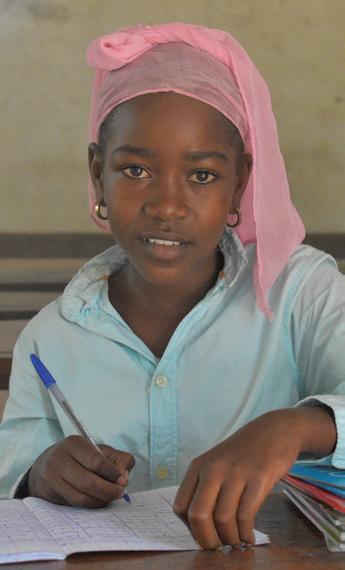
4 minute read
Top of Her Class: Improving Literacy Rates and Learning Outcomes
Top of Her Class: Improving Literacy Rates and Learning Outcomes
EDUCATION CANNOT WAIT IN COLLABORATION WITH UNHCR CHAD
At age three, Hawa experienced the biggest challenge of her life when she fled the conflict in the Central African Republic and became a refugee in Chad. There, against all odds, Hawa began her formal education and became among the best in her class. For Hawa, having the opportunity to learn every day makes her dream of becoming a doctor and caring for her family and community’s health seem within reach.
In 2014, Hawa and her mother sought refuge in Chad, escaping armed conflict, instability, and violence in the Central African Republic. Chad hosts Africa’s fourth largest refugee population, with over 800,000 refugees. Hawa settled in Doholo Refugee Camp and joined the camp’s primary school.
“I started school when I came to Chad. I didn’t get to go to preschool before because my village didn’t have one,” said Hawa. “In Chad, every day, I was in a hurry to join my class because I wanted to learn to read, write and speak French. Now I know how to do all these things, and I am helping the new girls get used to my school.”
Today, Hawa is 11 years old and thriving in school. Thanks to the Education Cannot Wait (ECW) First Emergency Response grant in Chad, delivered by UNHCR, Doholo Primary School has expanded to include an additional 12 new classrooms, nine new teachers, one additional water point, an administration building, and a teachers’ office and workspace. Teachers at Hawa’s school have also received extra training support to help new refugee students adapt to their environment. Providing mental health and psychosocial support services, and other holistic educational opportunities, ECW and partners ensure that girls and boys like Hawa can access education and continue to learn in safe and protective environments.
ECW investments extend to preschool and secondary schools and benefit refugee students at the Doholo Camp—relieving strain on limited resources and ensuring children have access to a full education cycle. Chad faces low literacy rates and challenges in transitioning students to secondary school. The main roadblocks to education stem from multi-dimensional crises such as climate-induced disasters, internal displacement, COVID-19, poverty, instability, and refugee influxes from neighbouring countries.
The Government of Chad has one of the most inclusive policies in the region to allow refugee children to access the national school system, with over 100,000 young refugees attending formal school in 2021-2022, according to UNHCR. However, with so many refugee children in need of education support in the country, limited infrastructure, and strained resources, it is challenging for schools to deliver quality education for all.
When the incoming refugee students first arrived at Doholo Primary School, the vast majority could not read or write. To address these challenges, ECW-funded programmes in Chad target vulnerable incoming and existing students—with a focus on addressing the specific needs of girls and children with disabilities—and support the expansion of educational resources so all girls and boys in the country can access safe, inclusive quality education.
Since 2017, ECW has invested $41 million in Chad, reaching nearly 835,000 children, including about 156,000 internally displaced people and 200,000 refugees. ECW’s funding includes a new $3 million allocation to provide safe and protective learning spaces to incoming refugees fleeing the war in Sudan.
For Hawa and her siblings, ECW’s support has improved their learning outcomes. Hawa is now one of the top students at her school—and has even been chosen by her teacher as a ‘transition buddy’ to ease the transition for incoming refugee students in her class and make them feel welcomed and supported.
“I am ranked among the best students in school,” said Hawa. “The new children who came were nervous at first, but now they’re happy to be in school.”










